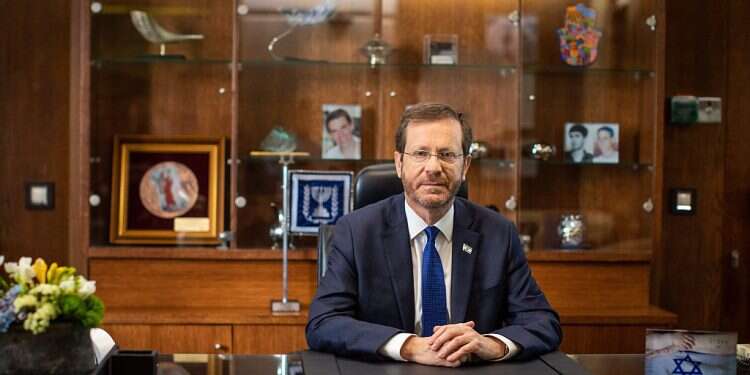On a shelf in the corner in President Isaac Herzog's office, a vinyl record stands alone. The old, black and white cardboard cover, is well-preserved. The front sports a portrait of the president's father, Chaim Herzog during his historic speech as UN ambassador to the General Assembly on Nov. 10, 1975, at the end of which he publicly tore into pieces the paper on which the UN resolution determining that "Zionism is a form of racism" was printed.
Follow Israel Hayom on Facebook, Twitter, and Instagram
In terms of public sympathy, the elder Herzog was a rock star in 1970s Israeli politics, so the record's prestigious place in his son's office is clear. But the complicated, deep and ambivalent relationship to text – the one that sees books as a superior value but can also tear up in protest a paper that endangers the eternity of Israel – has already been part of the Herzogian DNA for generations. The president's grandfather, Chief Rabbi Yitzhak Halevi Herzog, also ripped up a document containing a committee's decision – MacDonald's White Paper – during a stormy protest in 1939.
When I ask the president if he, in an era of the tremendous political challenges – and opportunities – that are facing the country, will also rip up a text at some point, he smiles.
"Each generation has its challenges and circumstances," he says. "I was privileged to see my father rip up the decision that determined Zionism is racism, and this battle hasn't disappeared from the world. The record of the battle, which is placed here, is a testament of sorts that I take with me from generation to generation, to continue to fight for our existence and for Zionism.
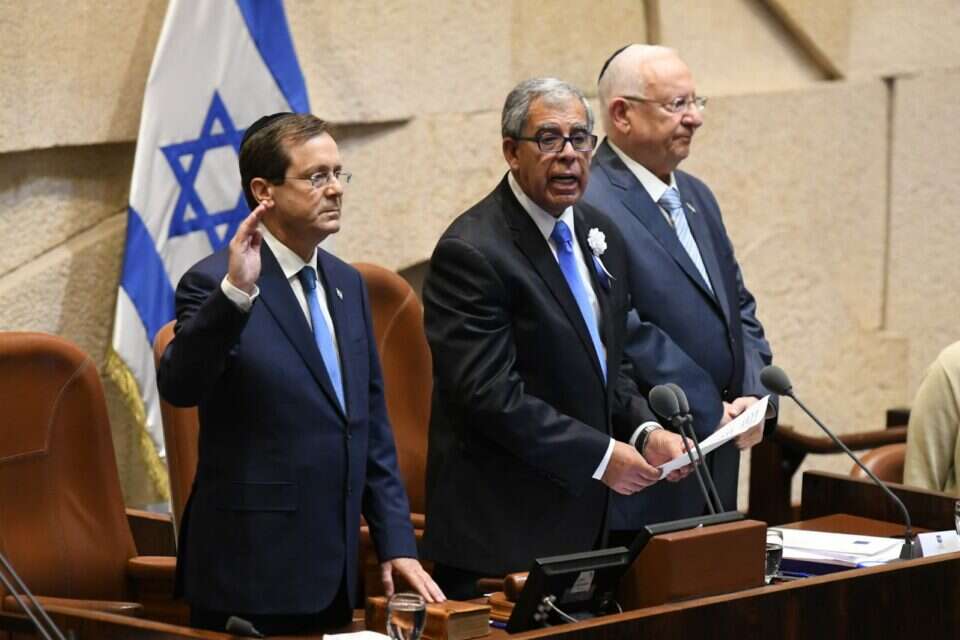
"Today, there are terrible and threatening voices trying to label us as an apartheid state. We need to spare no effort to fight them and that requires that we take action – extensive political activity, public diplomacy, and educational efforts, as well as a deep understanding on our part that we cannot, under any circumstances, agree to let these voices be heard."
Q: Do you also mean the rhetoric coming out of Tehran?
"Our enemies don't rest for a moment, especially the Iranians and their proxies. They are trying to drive a wedge between us and all the regional elements that are partnering with us, and I also think that some of the deliberate attempts we saw recently to fan the flames on the Temple Mount and the Al-Aqsa Mosque were part of this kind of attempt."
Q: It seems that such fears aren't about to disappear. A recent survey by the Pnima movement ahead of Holocaust Remembrance Day found that 47% of Israelis are concerned about a second Holocaust.
"I was surprised by the survey, and in my opinion, it reflects a state of generational accumulation within Israeli society, especially leading up to memorial days and Independence Day, and given security events. It's a feeling of fear, which on the one hand doesn't need to exist because we are a strong, stable, and extremely successful state, and on the other hand, it's natural when you were raised with this as part of the ethos of growing up in this country. It's etched in your mind and you move between memorial days.
"But there are of course positive events in history as well – post-Balfour Declaration and the San Remo Conference. So that positive memory is also developing."
Q: So, despite the fear, you are fully confident in Israel's national and security resilience?
"I have every faith in the power of the nation and the state to meet every challenge and faith in every one of its defense establishment. On Independence Day, we need to say thank you to the IDF, the Shin Bet, the Mossad, the Israel Police, and all security forces, who stand guard over our country and our cities. We pray that they will continue like this and that they will stop evil in its tracks.
"The recent wave of terror as well, which to a certain extent was unexpected, is part of the intergenerational challenge, in every generation. As a child, I was with my family in the shelter in Tzahala when the Jordanians shelled us from Qalqilya. They shelled the neighborhood because they knew that's where most of the IDF general staff lived. I said recently to King Abdullah – do you understand that this was my childhood experience? For me, to sit here with you, in Jordan, is a statement that radiates respect and peace and mutual cooperation, despite the disagreements."
In praise of soft power
Isaac Herzog took office as president on June 7, 2021, and it was the smoothest and most natural entrance to the Israeli President's Residence in decades. Free of the demons of Moshe Katsav, the fanfare of the late Shimon Peres, and the political strife that Reuven Rivlin brought with him into the job.
The accession of Herzog – a scion of a Jewish and Israeli dynasty – to the presidency was perfectly timed for a veteran politician seeking to replace ceremony and protocol with the diplomatic and social areas of influence.
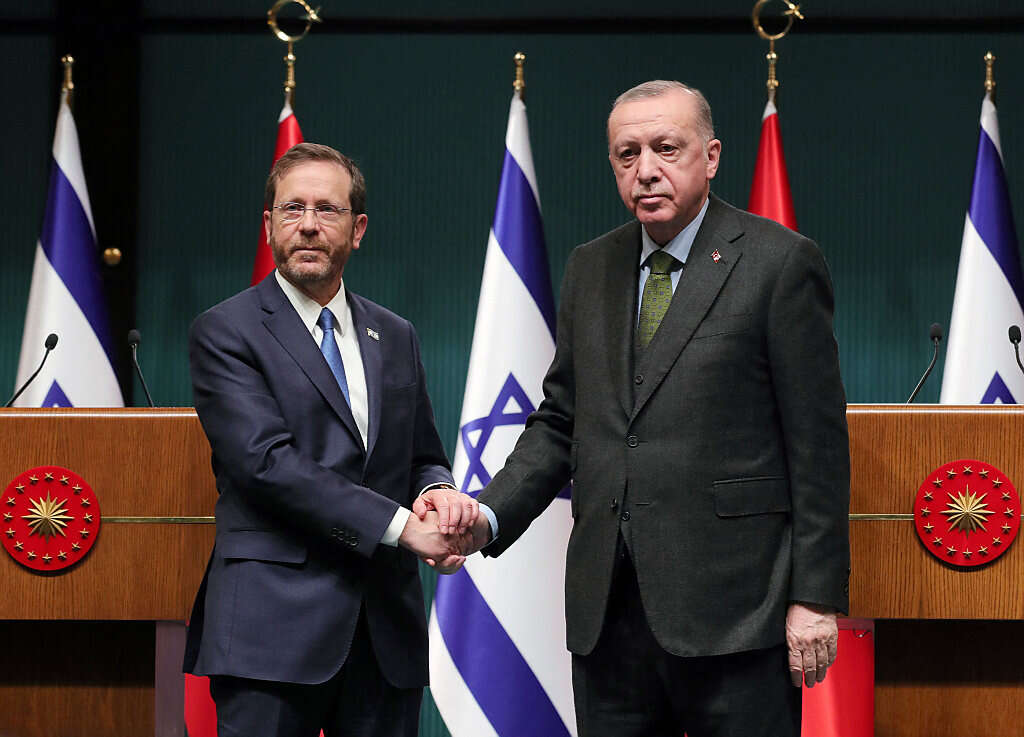
The prolonged political crisis that resulted in four election campaigns in two years and which has apparently still not peaked bred a chaotic reality during which Herzog emerged as the "responsible adult" – internationally, socially, and despite his clear stately position – also politically.
"As president, I wield only soft power," Herzog reminds me in our conversation. "It's a moral power, despite the fact that the president has the power to give any Knesset member the mandate to form a government. I lend great importance to political stability; it doesn't matter from what side – there needs to be political stability.
"Chronic instability exacts prices that, as citizens, we don't know how to assess, and directly impacts our quality of life, our cost of living, our health, our children's education, and our national security.
"A well-run state always has to pass a budget and plan for the long term. We face so many challenges that sometimes, and I'm not saying this as a cliché, I really don't sleep at night. Israelis are not without a protector, but when there is instability it also impacts our ability to meet these challenges. As president, I will make every effort to contribute to this security, not from the political standpoint of who leads, but with the aim of securing a healthy political process."
Q: Do you think that the system of government needs to change?
"All types of systems of government have been explored. Ultimately, we have to recognize that we are a multicultural society and therefore a multiparty one. As president, I try to work to promote the societal conception according to which Israel is the nation-state of the Jewish people, and within it, there are different groups, each with its own ethos and own identity. But there is one national ethos, and there is a positive energy of a society that has a mission, that together we can move forward.
"I'm not fooling myself – there will always be quarrelsome extremist forces, with terrible and belligerent rhetoric, but the silent majority wants to move towards reasonable shared existence."
Q: We are currently going through a period of security tensions, partly vis-à-vis the Arab sector, mostly with the Palestinians. During your time in the Knesset, you always had a very good relationship with the Arab leadership. How in your opinion can the flames be lowered?
"Most of the Arab public in Israel are going through dramatic processes of integration in every area of life and therefore I would be careful about stating that there is tension with Arab society. There is tension vis-à-vis certain groups. Most Arabs Israelis have a great desire to integrate, and this also influences Arab politics. Soon I will swear in the first Muslim judge in a permanent appointment to the Supreme Court, and Michal and I see on our trips many young Arabs who are breaking glass ceilings in different areas.
"The first Arab intern at my law firm, Herzog, Fox & Ne'eman, was my intern – his name is Samer Haj-Yehia and today he is the chairman of Bank Leumi, which was the bank Herzl founded for the Zionist movement. So the sky didn't fall and Samer is heading the bank with great success.
"This model needs to take place in other areas, and it happens in many countries, for example in India, where minorities take key positions. It happens in advanced societies, and it also needs to happen here."
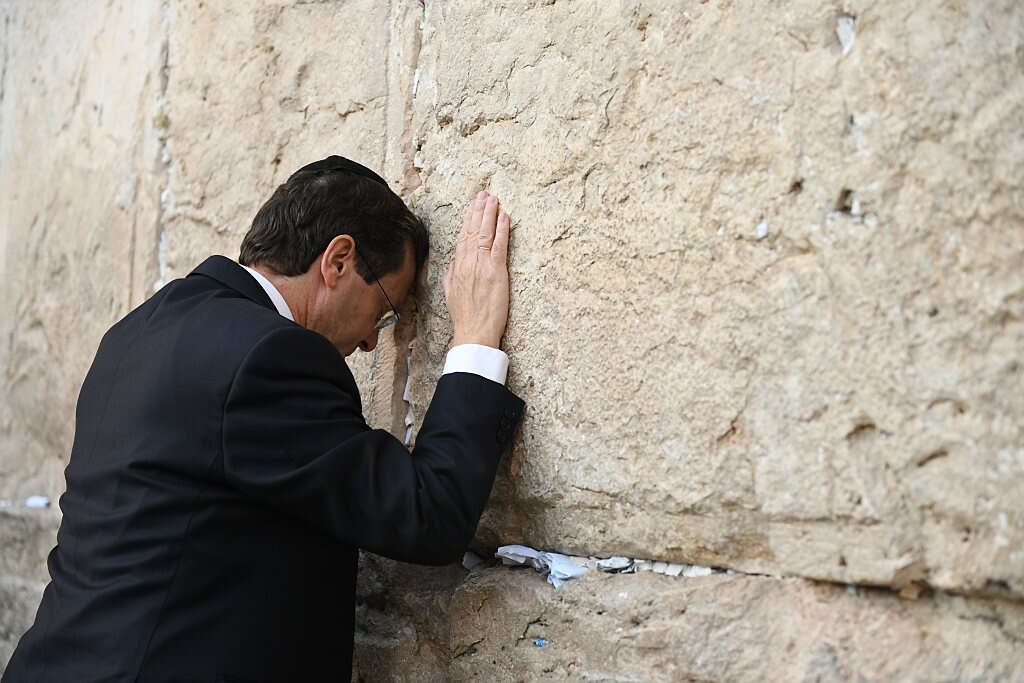
Q: But whenever Al-Aqsa enters the picture – mainly during Jewish and Muslim holidays that tend to turn into periods rife with terrorism – rationale goes out the window and incitement trumps moderation.
"There's no doubt that social media plays a key role in this situation because it presents unmediated output and allows distorted interpretations of reality. We, as the most sophisticated startup Nation in the world, need to produce solutions that will make the truth public knowledge. In addition, I call to earmark a special lesson in every Israeli school that will focus on all the religions and faiths that exist here. It's critical so that we can deal with and understand others in our society."
Q: And what about the longstanding ban on Jews visiting the Temple Mount over the past few years? Do you support this restriction?
"As the Jewish people and as the Jewish majority in the country, we always respected other religions and faiths, especially religions that believe like us in a single God – after all Judaism was the first to establish this faith. The Al-Aqsa Mosque is a sensitive place and this sensitivity has significance. Security forces are making great efforts to secure freedom of worship on the site, but this always requires extreme caution.
"I respect Jews who want to visit the Temple Mount, even though I am from the school of thought of my grandfather and the great rabbis to this day, which forbids such visits. Either way, there are times when one needs to respect the faith of the other and allow him to pray alone with his God. During the last 10 days of Ramadan, it's only natural that Israel will prevent Jews from visiting the Temple Mount in order to allow these prayers to take place."
Q: Do you believe that the Arab leadership needs to be part of the government?
"That's a political question, but the natural process of integrating political elements from Arab society into the decision-making process was always to be expected. We also need to allow this integration to happen at the highest levels. It's a process that takes place in all the nations. The Indian president told me that some of the commanders of the Indian army are Muslims, there's even a Muslim chief of staff, despite the fact that there's difficult inter-religious tension in India.
"It's true we won't see a Muslim chief of staff in Israel over the coming generations, but the symbolism of integration into the areas of life is correct and natural."
Playing the diplomatic game
During his tenure as Jewish Agency chairman, Herzog dealt a lot with aliyah from the Commonwealth of Independent States (CIS). But it seems that this was just the prologue to the significant aliyah that Israel is experiencing now, during the war in Ukraine, which shows no signs of ebbing.
"The tragedy in Ukraine is terrible and there is great suffering," the president said. "Thousands of Israelis are currently in Ukrainian territory to offer the Ukrainians humanitarian aid. A great portion of Ukrainian children are displaced, and therefore on Seder night, Michal and I hosted at the Seder table a mother and her small children, whose father is fighting in Ukraine. It's a wonderful Jewish family, who made aliyah via the Jewish Agency, and the situation around the Seder table was heartbreaking: the present that the child requested for the Afikoman was 'bring me my dad.'
"As this tragedy unfolds, there is another wave of aliyah, which we see from Ukraine and also from other CIS countries. It is conspicuous because of geostrategic developments that influence families that don't know what the future brings. In addition, there is an increase in the number of antisemitic incidents throughout Europe, and the Jewish communities are bracing for a spike in antisemitism because of the wave of refugees, the expected rise in prices, short supplies, and tensions that the war is producing.
"My advice to the Israeli government is to put together a significant program. A few years ago, I already proposed a national program for aliyah, since I expected a wave of aliyah because of coronavirus, which was indeed realized. Aliyah is a most welcome thing, and it gives Israel great momentum and growth in comparison to most countries.
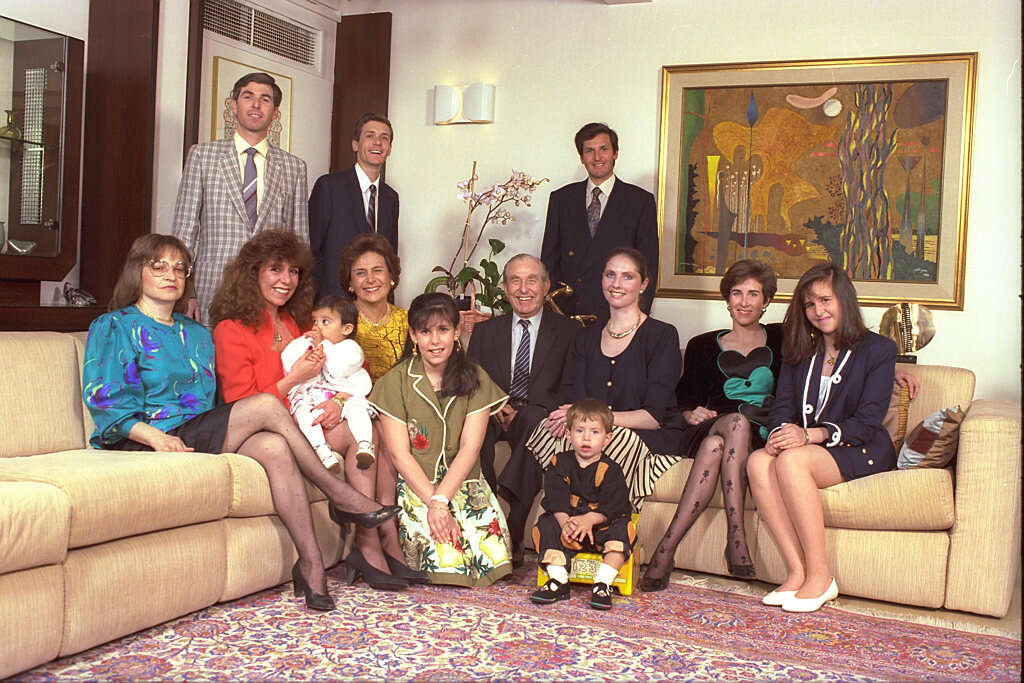
Q: As president, are you also involved in this war diplomatically, as you are, let's say, vis-à-vis Turkey and Jordan?
"I maintain contacts with heads of state worldwide on different issues, some of them behind the scenes. With respect to Ukraine and Russia, efforts are headed by Prime Minister Bennett, and I welcome his effort to mediate a ceasefire and foster dialogue between the two sides.
"Israel has proven advantages in this area because it maintains good relations with the leaders of both countries, and there are significant Jewish communities in the background. My first visit as president was to Ukraine, to inaugurate the memorial at Babi Yar, an emotional site, and since then, a few months before the war, President Zelenskyy asked if we could open a line of communication with Putin. I delivered the message – there was no response."
Q: You are a very significant diplomatic player – also because of the unique political situation of the government. How do you see your role in this arena, mainly so as not to step on the prime minister and foreign minister's toes?
"I came into the role with extensive diplomatic connections and a wealth of diplomatic experience, and I offer it in good faith and with full coordination. In my opinion, the advantage of my tenure is in the underlying awareness – which has now risen to the surface – of Israel's diplomatic integration in the region.
Next year we will mark the 50th anniversary of the Yom Kippur War. Back then we didn't have relations with a single one of our neighbors and today most of them are our closest allies. This speaks volumes.
"The Abraham Accords led to Hatikvah, the national anthem, being played in the most impressive palace in Abu Dhabi. King Abdullah hosted a formal reception for me, despite the challenges and the tensions, and this is an important historical development. The same goes for the visit to Turkey, which was actually the first Muslim country to recognize the State of Israel and to establish diplomatic relations with us, but there were ups and downs and difficult tensions over the years. There is a real effort by Turkey to improve relations. All of this creates an extremely positive atmosphere."
Q: Can we imagine visiting Saudi Arabia in the foreseeable future?
"There are countries in the region with which we have indirect or existing ties that need to get on the Abraham Accords bandwagon. Saudi Arabia is one of our target countries. It's a very important country that without a doubt needs to join the Abraham Accords. However, it's a process that doesn't only depend on us, but also on internal processes in Saudi Arabia, and on Saudi-US relations. I would definitely be happy to have the opportunity to openly visit Saudi Arabia one day."
Q: This is an important statement for Saudi ears.
"Correct, and it needs to be said. After I visited Turkey, I said that somewhere in the Middle East a 10-year-old child watched TV and saw footage of a Jewish leader, an Israeli, shaking hands with a regional Muslim leader – Erdogan, Mohammed bin Zayed, King Abdullah or President el-Sissi. This child says to himself – there's an alternative. His subconscious knows there is an alternative to war. It's clear that at the same time there are hostile elements that are trying with all their might to sabotage the process – with violence, with hate, by spreading lies. Therefore, the positive regional flow needs to be strong and it must be maintained so that no force will be able to stand against it."
'At eye level with great rabbis'
Herzog was born in Tel Aviv in 1960 and was named after his grandfather, Rabbi Isaac Herzog, who was the Ashkenazi chief rabbi of Mandatory Palestine and was later named Israel's first chief rabbi. The president seems to have also inherited from his grandfather a deep connection to Jewish texts and universal curiosity, as well as a close connection to the Chief Rabbinate: Rav Herzog was a magnet for all of the rabbis in the Land of Israel and founded Heichal Shlomo in Jerusalem [the former seat of the Chief Rabbinate of Israel], while his grandson, during his years in the Knesset, had extremely good relations with Haredi politicians.
The president stressed that, in his family, the dialogue between the world at large and Judaism goes back hundreds of years.
"My great-grandfathers Rabbi Yoel Halevi Herzog and Rabbi Shmuel Yitzchak Hillman were Torah giants but they were also part of the wider world. Rabbi Joel was a rabbi in Paris, and during that time he wrote a book against cars, which were being produced for the first time. He called the book The New Death, La Nouvelle Mort, which was published in French. The rabbi from the shtetl in Lomza wrote a pioneering book – for years we thought he was a little crazy but today, with the ecological crisis and car accidents, we see him completely differently.
"Rabbi Shmuel Yitzchak Hillman wrote a eulogy for King George. He was the head of the Beit Din in England and he wrote about the monarchy. Therefore, it's natural that my grandfather and my grandmother, Rabbanit Herzog, absorbed worldly ways their entire life. Rabbi Herzog's doctoral thesis from the Sorbonne and from the University of London was written in 12 languages about marine biology, about tekhelet [a blue-violet dye highly prized by ancient civilizations] and argaman [crimson] on the clothes of the high priest, which of course also finds expression in the colors of the Israeli flag. The entire family absorbed this spirit of endless curiosity.
"Books are a near-sacred value to us, and therefore I always take out the books of my grandfather and my father, books on philosophy and research, Jewish law. This year I hope to finish reading my grandfather's responsa and also the new editions by my great-grandfather, The Straight Light.
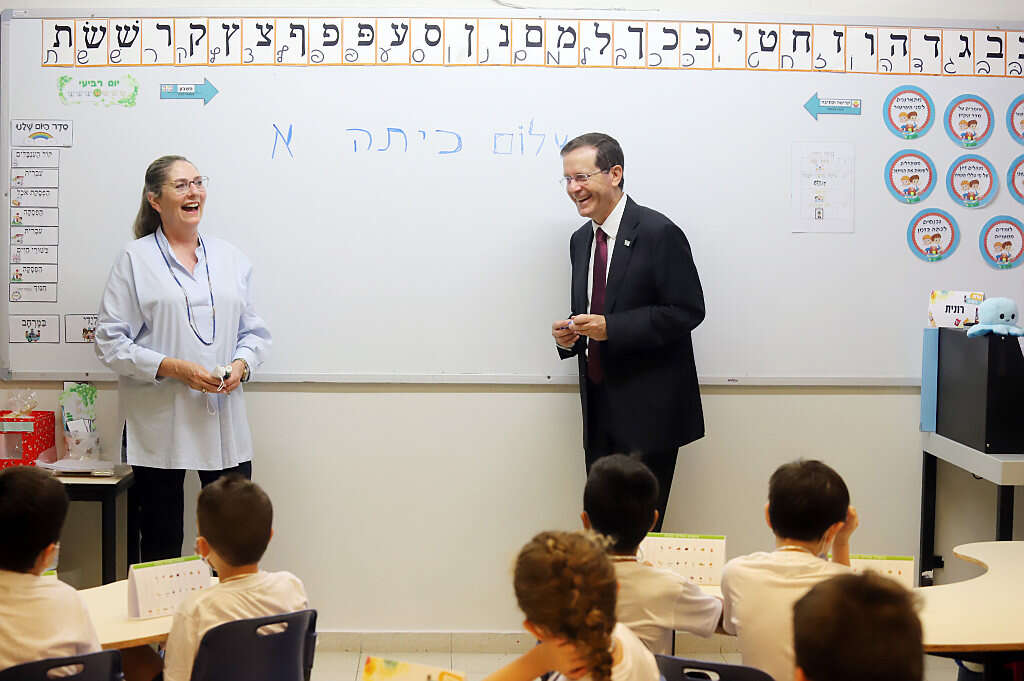
Q: It's universal, not local Judaism, in which the Jewish text is timeless and serves as a physical place and homeland.
"We attribute great importance to tradition, to the written word, and to seeing the wider world. Ultimately, our traditional worldview is central, moderate, varied, respectful, and extremely stimulated by new ideas. My brother Mike, the Israeli ambassador to the United States, has just published a book with Shlomi Hezki, about our father, who was a soldier in the British army during World War II, but the book is called A Jewish Soldier.
Q: Your father was seen as a more secular Jewish figure.
"My father studied at the Hebron Yeshiva [in Jerusalem], but he had a complicated relationship with religion. He had his faith, complete faith, but he also has a bone to pick with the rabbinical establishment because when he made aliyah from Ireland he found this establishment to be fossilized and oblivious to global reality.
"He thought religious politics was corrupt and was open – even blunt – about it. But he instilled faith in us and respect for the tradition, and I pray in the synagogue that he established in Tzahala. During the Holocaust years, my father bravely fought in the killing fields of Europe against the Nazis, and he was proud of his Judaism. He told an especially moving story of Seder night under massive German shelling, on the banks of the River Rhine before crossing it, and how together with another Jewish sergeant they took out a small package of matzah that they received from the rabbi. They said, 'next year in Jerusalem,' without knowing if they would live another five minutes.
"So, with regard to myself, the political experience that I have gathered together with the knowledge that I absorbed at home was, from my perspective, a great advantage because I felt that I could talk directly with the Torah greats. I learned at religious institutions, but the system that influenced me the most was at the Jewish Remez High School in New York, which was much less conservative than the state religious education in Israel, and opened wide horizons for me to see Diaspora Jewry.
"The school principal, Rabbi Yehezkiel Lokstein, who is 90, came to Jerusalem with his entire congregation for Passover, and I welcomed them to the President's Residence. Michal said to everyone 'you don't understand how much your rabbi influenced Isaac's life' – that's what she called me. All of this teaches, in my opinion, how important it is to know the ways of life of different communities, and there is also rich and varied Jewish life in other places."
New role, new look
This January Herzog's mother Aura, the wife of the sixth president, passed away, "a greater-than-life figure and an inexhaustible force," as her son described her after her death.
In recent months Herzog, an extremely family-oriented president, waged something of an internal struggle with himself – out of a desire to carry out his private mourning despite being a high-profile public figure. Stubble has adorned his face ever since, even though heads of state are exempt from the Jewish edicts of mourning.
"Ultimately, even the president is his mother's son and this dissonance is difficult," Herzog explained. "You want to go into mourning, to be with yourself, but on the other hand, you want to put on a façade. The beard is my way of expressing my mourning. I make sure that I am always at a minyan to say kaddish every day throughout the mourning period – I insisted on doing it even in Abu Dhabi and Ankara.
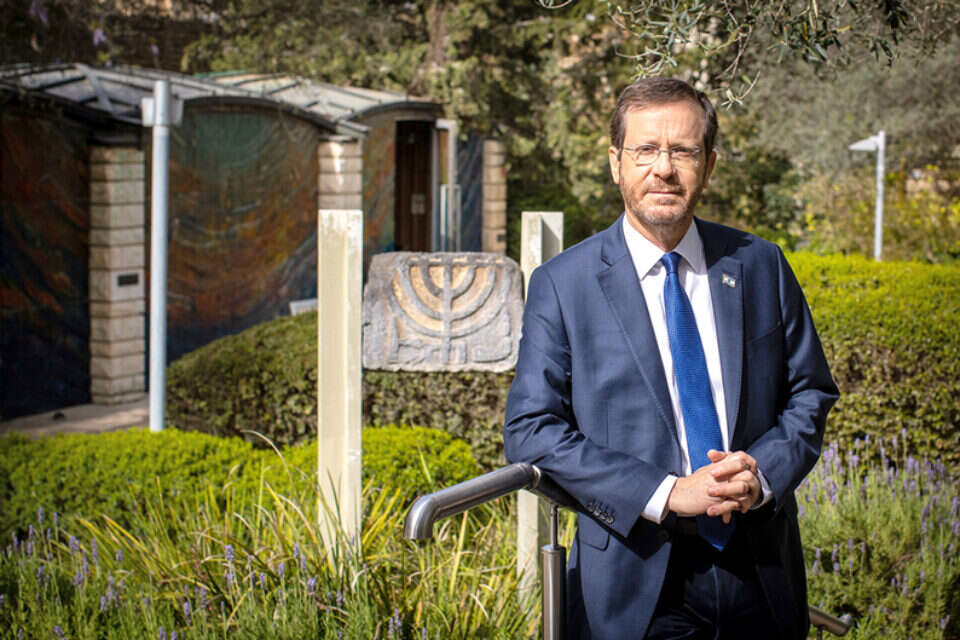
"After the 30 days, I trimmed back the beard but as it turned out, it was in demand. There was a family discussion, including – and I say this with a smile – recommendations by a few young fans [to keep it]. So, we'll see what I do after the counting of the Omer.
"We just finished the last day of Pesach, and it was the first Yizkor prayer in which I remembered my mother. It hit me. Yizkor is a very short but significant prayer. I remember how much my father honored this moment in his prayers."
According to Herzog, the presidency's commitment to the Israeli public as a whole results in "excitement from generations of Israelis, and mainly from the beauty of the young generation, who are enlisting and giving of themselves. Every meeting with soldiers lifts our spirits. Michal and I visit different military units, and we see the Israeli beauty, the result of this wonderful country from all kinds of aliyot and different backgrounds, with a commitment that is beyond doubt."
It seems that he doesn't accept Joint Arab List head MK Ayman Odeh's call for the Arab sector not to serve in Israel's security forces.
"I was excited recently to visit the Bedouin Desert Reconnaissance Battalion to mark Ramadan, and that's the answer to anyone who casts doubt on the need to integrate into all of the security forces, for minorities as well."
Q: In 2015 you suffered a painful defeat to Netanyahu in the elections. Today, when you are in the president's residence, the pinnacle of Israeli consensus, do you feel you have come full circle?
"Look, I have never done an in-depth exploration of my feelings on the subject, but your question is interesting. The chapter of the 2015 elections is behind me so in this sense I don't hold a grudge. I understand that there was a result, that it was legitimate, and I respected it, even if it pained me. I moved on, even if sometimes something flickers in my mind. Today, I'm in a different place, also in my political role. I can't be divisive, but I have to be a figure that every citizen can feel he can approach and that I will look them in the eyes."
Q: What do you wish to the Jewish people and the country on its 74th birthday?
"The source of our resilience is the wonderful familiarity that exists here, in every group, and this is what allows internal stability in a society that is challenged by many rifts and tensions. This is the security cushion. So, I wish all of the people of Israel a good and strong sense of familiarity, good health, love of Israel, and also, if I'm allowed a little humor and cynicism, to enjoy the successes and the achievements, the inexhaustible wisdom that exists, the hidden light that exists in this society. Happy Independence Day."

